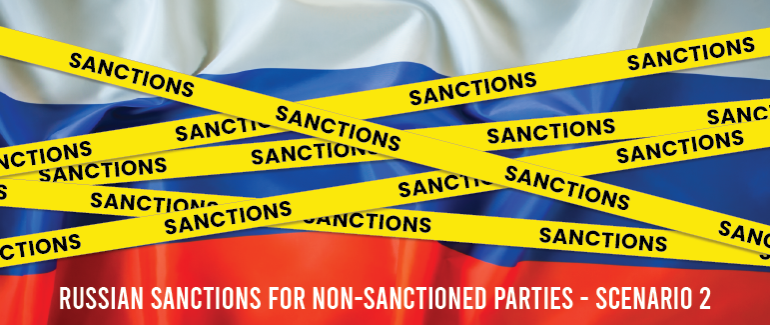We present to you the 3rd scenario of the 5-part series on “Conducting International Business and Commercial Transactions for Non-Sanctioned Parties: a 4 Scenarios Case Study”.
In this scenario we discover a situation where your company is a European business that has contracts with Russian enterprises to sell items that embed U.S. technology but did not require an export license issued by the U.S. Department of Commerce Bureau of Industry and Security (BIS) (i.e., microelectronics, telecommunications items, certain software, certain encryption items, sensors and optics, navigation equipment, avionics, marine equipment and aircraft components).
The information provided in this article does not, and is not intended to, constitute legal advice. Instead, these illustrations and the discussion that follows are intended to illustrate the complexities of the business and legal issues now at the forefront of cross-border business in Europe, Switzerland, the UK, the United States, Canada, Japan and Australia now that the 2022 Russian sanctions have turned once-straightforward business dealings between Russianentities and non-Russian counterparts into anything-but-simple high-stakes legal navigational puzzles, as well as to provide some general observations about the attendant legal issues.
I. THIRD SCENARIO – PRACTICAL ANALYSIS
Third, by way of further illustration, your company is a European business that has contracts with Russian enterprises to sell items that embed U.S. technology but did not require an export license issued by the U.S. Department of Commerce Bureau of Industry and Security (BIS) (i.e., microelectronics, telecommunications items, certain software, certain encryption items, sensors and optics, navigation equipment, avionics, marine equipment and aircraft components). You are about to ship, and you see an announcement in the trade press that BIS has changed the rules. But no one has notified you not to ship, and your export agent cannot provide with you definitive answers about what you should or should not do. And, you are not yet certain whether BIS’ jurisdiction to impose new rules binds you, a company in the UK, or the EU, or Switzerland.
II. THIRD SCENARIO
Generally
This scenario implicates six critically-important principles concerning US export controls laws and implementing US Export Administration Regulations (EAR) (administered and enforced by BIS), and companion EU export control regulations, particularly in the context of the 2022 Russian sanctions:
● If a product contains US technology, then US export control laws and licensing controls, re-export and country-transfer of the product is governed and controlled by the US EAR for the life of the product – regardless of whether the product already has been exported from the US and received by a foreign (non-US) importer.
● Material changes to US EAR – and particularly new restrictions on the re-export or country transfer of the technology to Russian intermediaries or end users – will apply immediately upon the effective date of the changes, regardless of the terms of the previously-issued export documents (including any US export permissions and licenses).
● In all instances, it is the responsibility of the exporter/re-exporter/country transferor to become aware of and comply with all changes to the EAR applicable to the exported US technology.
In most instances, no individual official notice will be sent to the exporter/re-exporter/country transferor.
However, customs/export agents customarily notify their clients of changes in US EAR; however, customs/export agents are not in a position to make legal determinations with respect to applicability and compliance.
● Owing to complexity of the EAR – including the new Russian sanctions provisions – making a determination of the applicability of such sanctions provision to the potentially-affected US technology, and whether any exceptions apply – almost always requires the assistance of American legal counsel well versed in both the US EAR and the new Russian sanctions.
● Non-compliance and violation of the EAR – particularly sanctions provisions – by a US person/entity or a non-US person/entity who has received US technology and who has illegally re-exported US technology to a sanctioned person, entity or territory is a serious civil and criminal offense under US criminal law and the EAR that is aggressively investigated and enforced by BIS, the US State Department and the US Department of Justice (DoJ).
The legal and financial risks posed by US BIS/DoJ sanctions enforcement actions are so serious that such cases have the potential to become “bet-your-company” matters that the targeted companies must defend by engaging experienced US white collar criminal attorneys and sanctions counsel, and then negotiating a global settlement.
● Without regard to the applicability of new US Russian export control sanctions, new EU Russian export control sanctions are likely to apply, and must be taken into consideration in the exporter/re-exporter/country transferor’s decision whether to proceed with the planned export to its Russian customer. See EU Council Decision 2022/328 (25 February 2022) at Article 1, prohibiting the “sale, supply, transfer or export, directly or indirectly” of “dual-use goods and technology” (as listed in Annex I to Regulation (EU) 2021/821 of the European Parliament and Council), “whether or not originating in [the EU], to any natural or legal person, entity, or body in Russia or for use in Russia.”
Steps with Respect to the Contemplated Export Transaction
Under this scenario, a responsible exporter/re-exporter/country transferor that learns of the new US and EU Russian export control sanctions should respond with the following actions:
● Immediately place the export transaction on hold pending determination of the extent to which the new US and EU Russian export control sanctions apply;
● Give written notification to the Russian importer of this action, including reasons why;
● Engage with highly-qualified US and EU export control/sanctions attorneys to receive advice and counsel concerning the applicability of the new US Russian export control sanctions, and the way forward;
● If the export transaction cannot proceed, then give such notice to the Russian importer pursuant to terms of the current controlling contract instrument between the non-US exporter and the Russian importer.
● In consultation with legal counsel that are experienced in dealing with the legal implications of sanctions frustrating commercial contracts under the law governing the contract between the non-US re-exporter/country transferor and the Russian counterparty, determine the best course to:
(1) Mitigate risk of breach of contract claims by the Russian counterparty; and
(2) Mitigate economic losses resulting from failure of the contract.
As part of this mitigation effort, the non-US re-exporter/country transferor should whether there are non-Russian customers for the product, and, if so, whether re-exporting/country transferring the product to such other customers requires any amendment of the existing US export/customs documentation or a new license, or additional EU export authorization.
In any event, upon the realization that sanctions might affect the transaction, it is advisable and appropriate for all parties to the transaction, as well as the business agent, to seek counsel from attorneys highly experienced in the applicable sanctions law, in addition to the parties’ respective transaction counsel.




